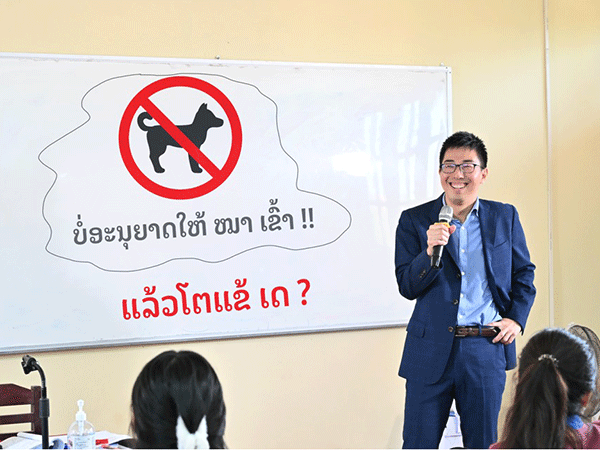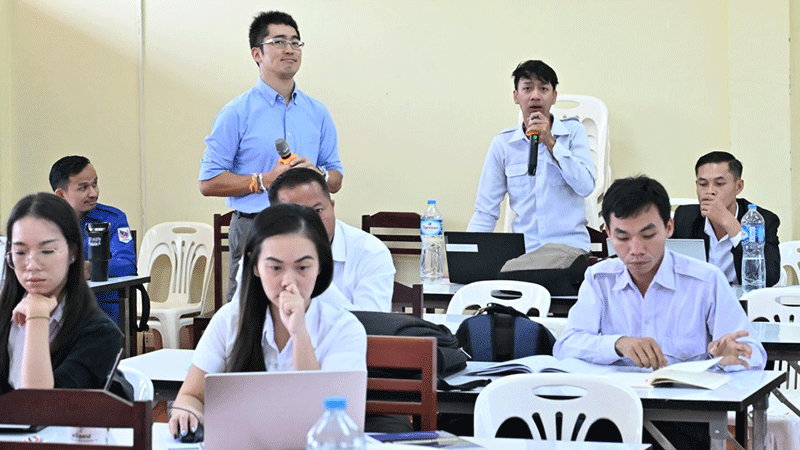Future Lao legal practitioners welcome JICA experts’ lecture
As part of the Japan International Cooperation Agency’s (JICA) Legal Project in Laos, experts delivered a lecture titled “Acquiring Professional Legal Skills” to students at the National Institute of Justice (NIJ) on November 11, 2024.
 |
| Japanese lawyer, Mr Akitaka Asambo, shows how legal specialists should read and consider the law. |
The Japanese experts, including prosecutor Mr Hayato Yaoita and lawyer Mr Akitaka Asambo, presented to approximately 80 enthusiastic NIJ students in the first part of a two-session series.
The lecture series aims to equip emerging Lao legal scholars with essential skills for interpreting legal documents and applying laws in real-world cases.
JICA will continue with the second lecture in the series on November 25, further exploring legal analysis abilities, a skill many of these students will carry into their future careers.
NIJ students, many aspiring to become judges, prosecutors, or lawyers, are currently studying judicial practices related to civil and criminal procedures.
The JICA experts regard the development of analytical skills as fundamental to legal education, with these skills universally applicable across various branches of law and providing a structured approach to interpreting legal texts.
In the first session, which focused on the Civil Code, Mr Asambo highlighted the importance of interpreting laws with a clear understanding of “PURPOSE OF LAW”.
He explained that judges, much like referees in football, must interpret rules objectively, upholding impartiality and clarity. If legal practitioners interpret laws without a grounded rationale, the uniformity of legal application can be compromised.
Mr Asambo encouraged students to consider the intentions of Lao lawmakers, noting that identifying a law’s purpose is what sets trained legal professionals apart in legal discussions.
Addressing the Penal Code, Mr Yaoita introduced the concept of structured legal thinking through a case study, where he prompted students to debate whether certain actions constituted theft.
 |
Japanese prosecutor, Mr Hayato Yaoita, directs questions to students on how to read expressions in the Penal Code. |
Mr Yaoita emphasised that legal practitioners must develop a logical framework beyond reaching conclusions, articulating each step towards a final judgement.
He stressed the need for legal specialists to clarify the precise meaning of each term in practical cases, as specific terms within articles may not be self-explanatory.
Mr Yaoita further explained that “LEGAL INTEREST” which is similar to “PURPOSE OF LAW” is a critical element in legal interpretation, with each crime outlined in the Penal Code aiming to protect certain rights or benefit society by penalising specific actions, and that legal practitioners must interpret articles with this in mind.
For over two decades, the JICA Legal Project has played a pivotal role in developing the rule of law in Laos, contributing to research and drafting relating to the Civil Code and Penal Code.
Beyond these legislative contributions, JICA has prioritised capacity development among future Lao legal professionals to foster sustainable development within the legal sector.
JICA hopes these lectures inspire young Lao legal practitioners to develop robust legal skills, enabling them to contribute to the rule of law in Laos.
Legal texts supported by JICA are publicly accessible on the “JICA Legal Project in Laos” Facebook page and are available to all legal professionals and students interested in advancing their knowledge.
By Times Reporters
(Latest Update November 14, 2024)
|



